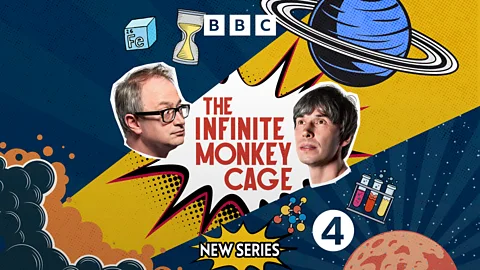
The Infinite Monkey Cage
The Infinite Monkey's Guide To... (Series 2)
The Infinite Monkey's Guide to… The Gods
Up next
April 24, 2024
22 minutes
Available for over a year
Robin Ince and Brian Cox tackle the thorny debate over whether science and religion can co-exist. But forget the tension between the church and the researchers – Eric Idle wants an answer to the important question of whether God is in gluten free communion bread? Katy Brand launches the inaugural theologian’s corner with a pair of Reverends, who explain that comedians and the clergy have a lot in common, including a tendency to like the sound of their own voices. As we learn more about how our universe works, will there even be a need for religious belief? Since some research suggests fundamentalists and zealots tend to be less intelligent, perhaps there’s a case to be made for some healthy scepticism.
